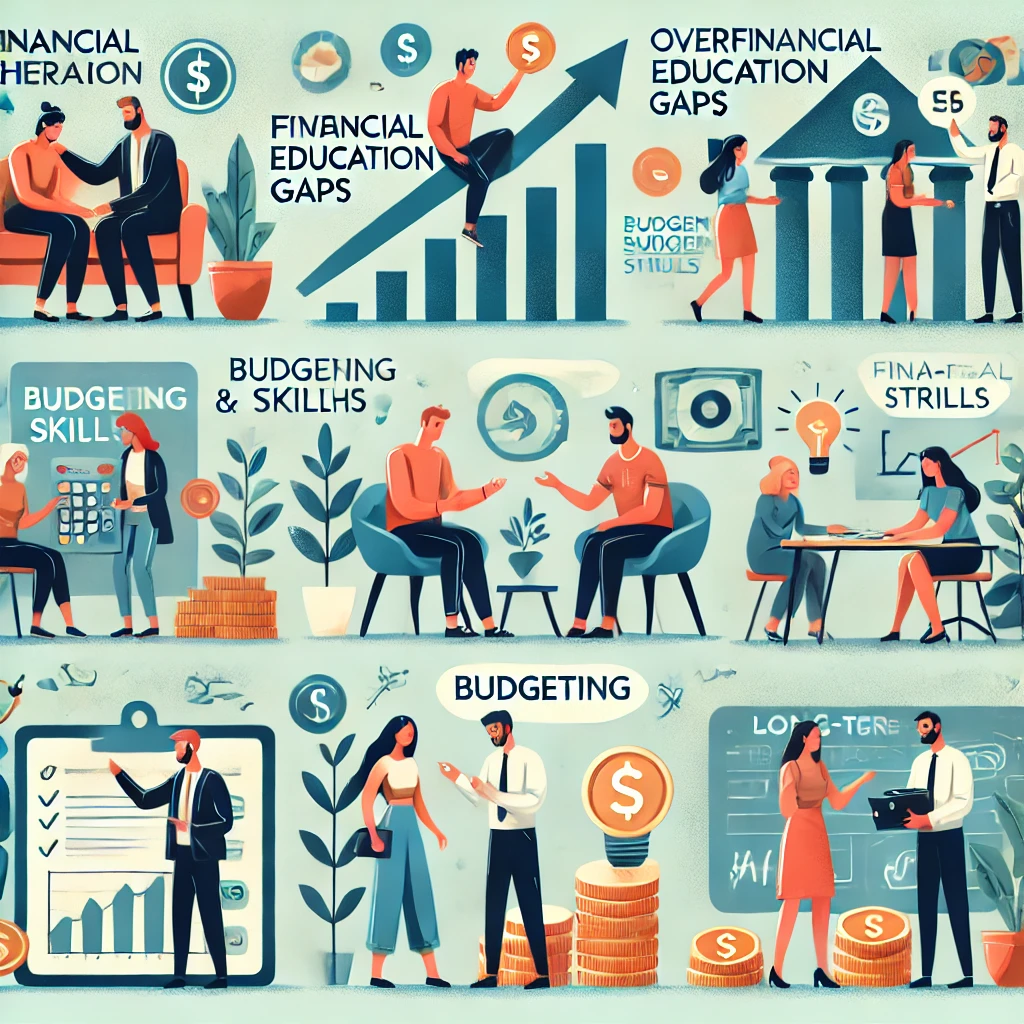Bridging Your Financial Education Gap
In today’s fast-paced world, having a solid understanding of financial concepts is crucial for personal and professional success, yet many individuals face a Financial Educational Gap. Many individuals, however, struggle with a Financial Education Gap that leaves them ill-prepared to make informed financial decisions. Bridging this gap is essential to achieve financial stability and growth. This article will explore effective strategies for bridging your Financial Education Gap, providing actionable tips and resources to help you enhance your financial literacy.
Understanding the Financial Education Gap
What is the Financial Education Gap?
The Financial Education Gap refers to the disparity between the financial knowledge individuals need and what they actually possess. This gap can lead to poor financial decisions, increased debt, and missed investment opportunities. Addressing this gap is crucial for achieving financial independence and security.
Why Does the Financial Education Gap Exist?
- Lack of Education: Many schools do not include comprehensive financial education in their curricula, leaving students without essential financial skills.
- Complex Financial Systems: The complexity of financial systems and products can be overwhelming, making it difficult for individuals to understand and navigate them.
- Economic Disparities: Socioeconomic factors can limit access to financial education resources, widening the gap for underprivileged communities.
Steps to Bridge Your Financial Education Gap
1. Identify Your Knowledge Gaps
- Self-Assessment: Start by assessing your current financial knowledge. Identify areas where you feel less confident, such as budgeting, investing, or understanding credit scores.
- Set Goals: Establish clear financial education goals. Determine what you want to achieve, whether it’s learning to manage debt, save for retirement, or invest in the stock market.
2. Utilize Online Resources
- Educational Websites: Websites like Investopedia and Khan Academy offer comprehensive resources on various financial topics.
- Online Courses: Platforms like Coursera, edX, and Udemy provide free and paid courses on personal finance, investing, and more. Enroll in these courses to gain structured knowledge.
- Webinars and Podcasts: Attend financial webinars and listen to podcasts hosted by financial experts. These can provide valuable insights and keep you updated on financial trends.
3. Read Books on Personal Finance
- Recommended Reads: Books such as “Rich Dad Poor Dad” by Robert Kiyosaki, “The Total Money Makeover” by Dave Ramsey, and “Your Money or Your Life” by Vicki Robin offer practical advice and strategies for financial management.
- Library Resources: Utilize your local library to access a wide range of financial education books and resources for free.
4. Seek Professional Guidance
- Financial Advisors: Consider consulting a financial advisor for personalized advice and guidance. They can help you develop a financial plan tailored to your needs.
- Workshops and Seminars: Attend financial workshops and seminars in your community. These events often feature expert speakers and provide opportunities to ask questions and network.
5. Practice Financial Management
- Budgeting: Create a detailed budget to track your income and expenses. Use budgeting apps like Mint or YNAB (You Need A Budget) to simplify the process.
- Saving and Investing: Start a savings plan and explore investment options. Even small, regular contributions to a savings account or investment fund can yield significant results over time.
- Debt Management: Develop a strategy to pay off debt. Focus on high-interest debts first and consider debt consolidation if necessary.
6. Join Financial Education Communities
- Online Forums: Participate in online forums and communities focused on financial education. Websites like Reddit’s r/personalfinance and Bogleheads offer support and advice from fellow learners.
- Local Groups: Join local financial literacy groups or clubs. Engaging with a community can provide motivation and accountability as you work towards your financial goals.
Overcoming Common Financial Education Barriers
Addressing Socioeconomic Challenges
- Scholarships and Grants: Look for scholarships and grants specifically for financial education. Many organizations offer financial aid to help individuals improve their financial literacy.
- Free Resources: Take advantage of free financial education resources offered by non-profits and community organizations.
Simplifying Complex Concepts
- Break It Down: Simplify complex financial concepts by breaking them down into manageable parts. Focus on one topic at a time to avoid feeling overwhelmed.
- Visual Aids: Use visual aids such as charts, graphs, and infographics to better understand financial data and concepts.
Staying Motivated
- Set Milestones: Set short-term milestones to track your progress. Celebrate small achievements to stay motivated.
- Find a Mentor: Seek out a mentor who can guide you through your financial education journey and provide encouragement.
The Future of Financial Education
The Role of Technology
- Innovative Tools: Emerging technologies like artificial intelligence and blockchain are creating new financial education tools and resources. Stay informed about these developments to leverage the latest innovations.
- E-Learning Platforms: The rise of e-learning platforms is making financial education more accessible than ever. Utilize these platforms to continue your education.
The Importance of Continuous Learning
- Lifelong Learning: Financial education is a lifelong journey. Continuously seek out new knowledge and skills to adapt to changing financial landscapes.
- Adaptability: Stay adaptable and open to learning about new financial products, services, and strategies.
Conclusion: Empower Yourself by Bridging the Financial Education Gap
Bridging your Financial Education Gap is a crucial step towards achieving financial independence and security. By identifying your knowledge gaps, utilizing online resources, seeking professional guidance, practicing financial management, and joining financial education communities, you can enhance your financial literacy and make informed decisions.
External Link: For additional resources on financial education, visit The National Endowment for Financial Education (NEFE).
Take control of your financial future by investing time and effort into bridging your Financial Education Gap. Empower yourself with the knowledge and skills needed to navigate the complexities of the financial world and achieve your financial goals.
To read more articles like this, visit: Regent Studies




